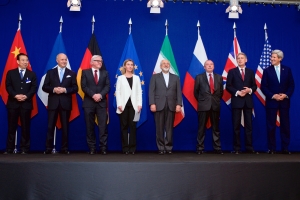Introduction
Iran's approach to foreign policy changed dramatically after Hassan Rouhani was elected President of Iran in 2013. The most serious and comprehensive negotiations regarding Iran’s nuclear program started in 2013 between Iran and six world powers including the United States. An interim agreement was reached on November 24, 2013. A framework agreement was reached on April 2, 2015. And finally, the comprehensive deal was reached on July 14, 2015 to ensure that Iran’s potential pathway to developing a nuclear weapon is blocked.
Over the past two years, since the negotiations started, various CPD Blog authors have written about the public diplomacy implications of these negotiations and the final agreement for the countries involved. This issue of CPD Monitor begins with a recent article by R.S. Zaharna discussing the implications of the nuclear agreement for the United States' credibility and image abroad, a recurring theme in most of the following articles in this issue as well. The other entries by Rob Asghar and Javad Rad provide a good overview of how U.S. foreign policies towards Iran differ from U.S. soft power and popularity in the Muslim world. Other pieces by Philip Seib and Sohaela Amiri explore more specifically U.S.- Iran public diplomacy as it relates to the nuclear negotiations, as well as the repercussions of the Israeli and Saudi PD campaigns to oppose the nuclear agreement.
Issue Contents
- Introduction
- A Tale of Two Speeches: American Identity and Diplomacy
- Economic Sanctions as Temper Tantrums
- The U.S.’ Image Among Shia Muslims
- Lessons From the Past: U.S.-Iran Public Diplomacy
- Israel, Public Diplomacy, and the Iran Agreement
- America and Iran: Following Up with Public Diplomacy
- PD News Stories Related to the #IranDeal
Most Read CPD Blogs
-
January 29
-
January 20
-
January 28
-
January 2
-
February 6
Visit CPD's Online Library
Explore CPD's vast online database featuring the latest books, articles, speeches and information on international organizations dedicated to public diplomacy.









Add comment